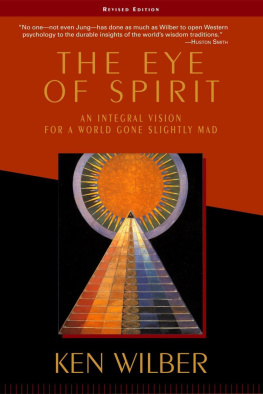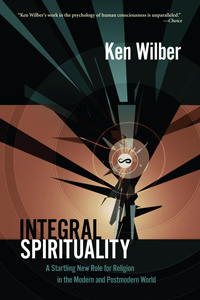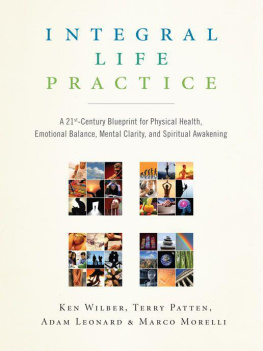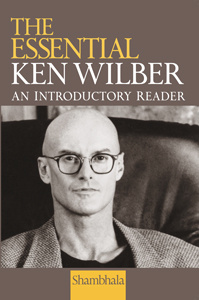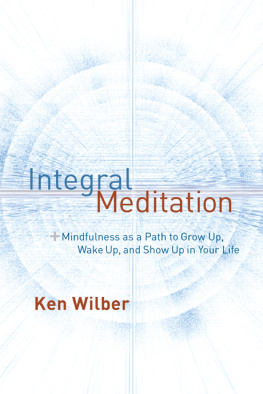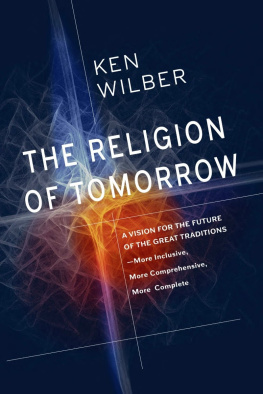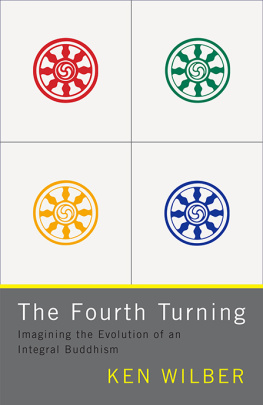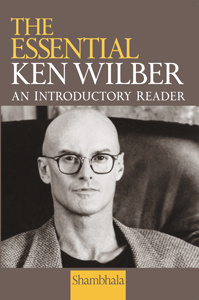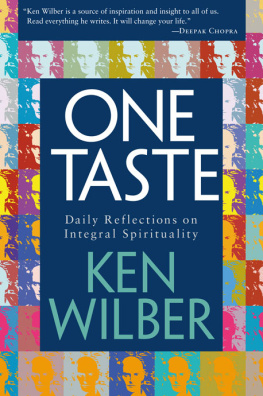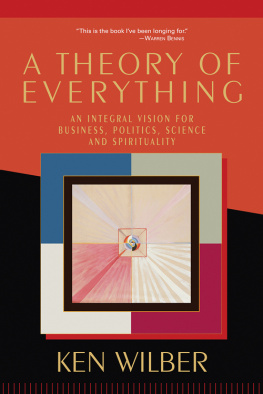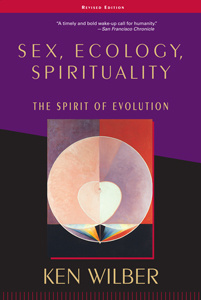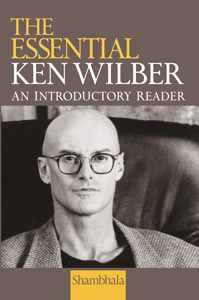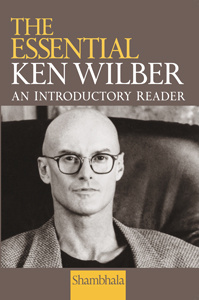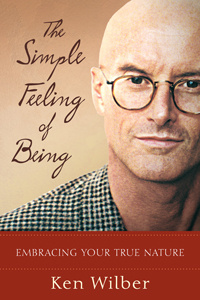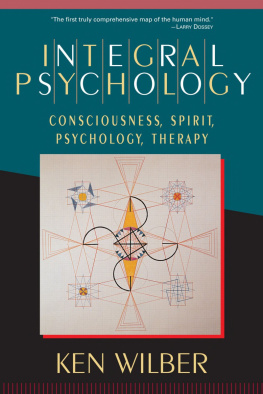This intellectually demanding yet engagingly written collection of essays explores a number of timely and important issues, such as the relationship between psychological and spiritual growth and the political implications of where we locate Spirit (God? Gaia?). Along the way, the author revisits his earlier books, revealing how his thought has developed and, in the process, introducing his central ideas to the first time reader.
Keith Thompson, San Francisco Chronicle
ABOUT THE BOOK
In this groundbreaking book, Ken Wilber uses his widely acknowledged spectrum of consciousness model to completely rewrite our approach to such important fields as psychology, spirituality, anthropology, cultural studies, art and literary theory, ecology, feminism, and planetary transformation. What would each of those fields look like if we wholeheartedly accepted the existence of not just body and mind but also soul and spirit?
In a stunning display of integrative embrace, Wilber weaves these various fragments together into a coherent and compelling vision for the modern and postmodern world.
KEN WILBER is the author of over twenty books. He is the founder of Integral Institute, a think-tank for studying integral theory and practice, with outreach through local and online communities such as Integral Education Network, Integral Training, and Integral Spiritual Center.
Sign up to learn more about our books and receive special offers from Shambhala Publications.

Or visit us online to sign up at shambhala.com/eshambhala.
THE EYE OF SPIRIT

An Integral Vision for a World Gone Slightly Mad
THIRD EDITION EXPANDED
Ken Wilber

SHAMBHALA
Boston & London
2011
S HAMBHALA P UBLICATIONS , I NC .
Horticultural Hall
300 Massachusetts Avenue
Boston, Massachusetts 02115
www.shambhala.com
2001, 2000 by Ken Wilber
Cover art: Untitled No. 1 from the Series Altar Paintings, Hilma af Klint (18621944).
All rights reserved. No part of this book may be reproduced in any form or by any means, electronic or mechanical, including photocopying, recording, or by any information storage and retrieval system, without permission in writing from the publisher.
Library of Congress Cataloging-in-Publication Data
Wilber, Ken.
The eye of spirit: an integral vision for a world gone slightly mad/Ken Wilber.3rd ed., expanded.
p. cm.
Includes bibliographical references and index.
eISBN 978-0-8348-2222-1
ISBN 978-1-57062-871-9 (pbk.: alk. paper)
1. Spiritual life. I. Title.
BL624 .W53 2001
191dc21
2001040061
Contents
What Is the Meaning of Integral?
On God and Politics
T HE E YE OF S PIRIT is an important book in my overall work, I believe, because it marked the first sustained application of my most recent and up to date model to particular disciplines such as psychology, art, and literature, and spirituality. This model (also called phase-4) was first presented in detail in Sex, Ecology, Spirituality; a popularized version was offered in A Brief History of Everything, and an even more popular version in A Theory of Everything. But the specific application of this latest modelin cultural studies, psychology, feminism, art, science, and spiritualitywas first presented in the book you now hold in your hands. Further, this book still contains my own single favorite piece of my writing (Integral Art and Literary Theory), and it contains the best short overview of my psychological model (Waves, Streams, States, and Self). For all these reasons, I believe that The Eye of Spirit is a cornerstone book for those wishing to understand a more integral, comprehensive, and balanced approach to the Kosmos.
As with all of the recent paperback reissues of my major books, this one is based on the edited (and revised) version that appeared in The Collected Works of Ken Wilber, volume 7. For this paperback, I have also added a new chapter, the aforementioned Waves, Streams, States, and Self: An Introduction to My Psychological Model (Or, Outline of an Integral Psychology). Combined with the Introduction, that chapter gives a fairly comprehensive overview of some of the essentials of the integral paradigm I have suggested.
The title Waves, Streams, States, and Self is itself a brief summary of the psychological model. Namely: there are levels or waves of consciousness, stretching from matter to body to mind to soul to spirit. Through those levels pass numerous developmental lines or streams of consciousness (the cognitive line, the moral line, the psychosexual, the interpersonal, the affective, the spiritual, etc.). These lines or streams develop in a relatively independent fashion, so that a person can be at a high level of development in some lines (e.g., the cognitive), medium in others (e.g., moral), and low in still others (e.g., spiritual). Thus, there is nothing linear about overall development. Moreover, in addition to waves and streams of consciousness, there are altered states of consciousness, and a person can have an altered state or peak experience at virtually any level or stage of development, and so once again, the nonlinear nature of overall development becomes apparent. Finally, balancing and integrating all of the waves, streams, and states of consciousness is the self (or self-system), whose job it is to navigate the various currents of the psyche from the lowest to the highest. All of those items are fully discussed in Waves, Streams, States, and Self (chap. 12). When added to the quadrantswhich are fully outlined in the Introductionthe result is a fairly comprehensive overview of an integral system.
Waves, Streams, States, and Self also suggests that there are at least four major, different definitions of spirituality, and unless we honor all four of these definitions, we get into insuperable theoretical difficulties very quickly. Briefly, spirituality can be viewed as the highest stages in any of the lines; as a separate developmental line itself; as an altered state or peak experience; as an attitude that may or may not be present at any stage. The application of these four definitions of spiritualitywhich I contend are actually four aspects of overall spirituality itselfdoes much to further the understanding of this most important of topics.
As you will see in the following pages, the most common criticism of my model is that it is linear, a view I have not held for twenty years (i.e., the phase-2 model). I hope that you will forgive my exasperation at some of these critics who continue to attack my model without first representing it accurately. It is, to say the least, irritating; and you will see some of this irritation in the following pages. (I could have edited these few sections out, but these ill-informed critics deserve a bit of public scolding, and it definitely livens things up!)
But what about spirituality itself? Does it necessarily unfold in stages? My answer, again, is absolutely not. Or, more precisely, of the four aspects of spirituality that I outlined, two of them tend to show developmental stages, and two of them do not. The first two aspectsspirituality as the highest stage(s) in any line, and spirituality as a separate developmental line itselfdefinitely show development, by definition. These developmental aspects of spirituality have been investigated by researchers from James Fowler to Daniel P. Brown, and their empirically based research needs to be honored and included in any truly integral model of spirituality. But the other two aspects of spiritualityaltered states and attitudedo not necessarily show development, do not generally unfold in stages, and yet also represent some very important aspects of spiritual consciousness. The acrimonious argument about stages of spiritualitysome say there are stages, some vehemently deny itis based on a less-than-integral approach to spirituality, because the fact is, both sides of the argument are correct. In chapters 9 and 10, I focus on some of those aspects of spirituality that show stage-like development; in chapter 12, I highlight the importance of altered states and attitudeall of which need to be included in any integral theory of spiritualityand in any integral spiritual practice.
Next page
